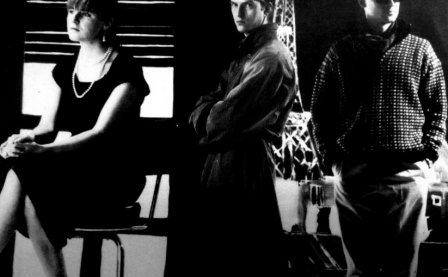Weekend’s new album Sports starts off like some kind of rock-and-roll stem cell: a post-punk umbilicus whipping in the sonic void. We hear a classic rock backbeat played in jagged no wave style, a radioactive rhythm that could become everything and nothing — Joy Division, Ministry, My Bloody Valentine, No Age. It’s then joined by layers upon layers of distorted guitars and howling voices, a rush of sounds triggering all sorts of impossible references — Springsteen, The Cure, Pavement, Interpol, Clap Your Hands Say Yeah. But even this uncanny racket outstrips itself and becomes a single propulsive mix of feedback and distortion. It breaks open again and again, exceeding its own force, until the song itself becomes sheer potential: not just the potential to become this or that, to sound like x, y, or z, but potential in the truest form, as the yet-to-be-actualized: noise falling into sound and back again. It’s a painful, awesome moment, perhaps the most magnificent moment of the year in music, encapsulating a long post-punk history of sonic havoc — and you don’t know whether to run for your life or turn that shit up. But, yeah, you’re gonna turn that shit up.
Hidden somewhere in this opener is a monster. You can hear him at the minute-and-a-half mark: a howling zombie with a chainsaw, looking to carve through your frontal lobe. I’m not speaking in metaphors here: this is zombie music plain and simple. Not music about zombies or music that borrows the style of zombie movies or even music that zombies might create, but music that is actually undead. Everything here lives in a horrifying half-life, both marked and unmarked, present and absent, familiar and terrifying. The album is full of howls and moans, sudden explosions, and unbearable sirens; the band uses all its unbearable noise to create sprawling, decimated soundscapes full of panic and dread. “Youth Haunts” lays down a primitive tom-tom beat and frantic squalls of distortion; the singer, shrouded behind veils of reverb, warns of “Strangest Autumn heat/ The dogs are dying in the sun/ Bodies hidden behind doors.” “Monongah, WV” comes off like the suppressed soundtrack to George Romero’s Dawn of the Dead; with its menacing bass line and drowning vocals, it offers all the panic and dullness of suburban zombocalypse: “Parking lots, shopping malls, empty hours/ Torn apart, sinking low, feeling fine, oh my god.”
For Weekend, though, the half-life of the zombie is also the half-life of youth: the twilight of fading adolescence and the horror of growing old. This is an album full of afterthoughts and afterimages; teenage pleasures and pains haunt it in all sorts of anxiously adult ways. As Shaun Durkan sings on “End Times,” this is the “Kodak landscape of my past, a burial in ash,” haunted by “eyes that speak of distance.” These are zombie eyes as well as the eyes of memory, both too distant and all too near. Indeed, like all great zombie flicks, this album really messes with your sense of time. Everything seems both past and future; each sound is an echo and a threat, foregone and impending. This is accomplished mostly via the heavily reverbed mix and the constant drone of feedback and noise; menace lurks everywhere beneath the sonic surface. At the same time, Taylor Valentino’s drumming generates startling shifts in tempo and rhythm, especially on “Youth Haunts” and “Veil”; he can speed up and slow down time at whim, undermining — like the best horror film editing — all temporal expectation. As Durkan sings, one by one, the “structures built to uphold time” wind up “falling to the beating of a drum.”
But just as zombies carry with them the social markers of their former lives (baseball caps, jewelry, tattoos, etc.), these songs are cluttered with the debris of our shared indie past. Sure, once you’ve seen one zombie film, you’ve seen them all, and there are moments when “Sports” seems merely derivative (“Age Class”). The album thins out in the second half, and, stripped of its glorious feedback, it sounds more and more like hackwork: a bunch of 80s new wave influences (Joy Division, Wire, Killing Joke, My Bloody Valentine) run through a no wave filter (Sonic Youth, No Age, Japandroids).
But there’s no doubt that the band, like some lab experiment gone awry, makes these dead forms walk again. Perhaps the best that can be said is that Weekend’s songs are awesomely generic, using all they’ve got to reanimate the various parts of the past. They turn clichés into monsters and monsters into clichés, giving the lie — for better or worse — to the presumed death of indie culture. In this, the band’s greatest strength is its use of feedback, the most spontaneous and the most clichéd gesture in the post-punk toolkit. In a way, feedback is the zombie half-life of guitar noise itself: both dead and alive, an echo of past song and its future. Here, in these tunes, it rises like some kind of sonic byproduct, a deformed waste, only to double-back on each song, on each dead style, and make it jump again.
No one wants to see a zombie in the rear-view mirror, and nobody wants music that reeks of old trends, but both have their uses. Bands like Weekend have us looking nervously over our shoulder as we drive recklessly into the future. As Durkan sings in the album’s last few moments: “Leave death behind, an epitaph/ I came alive, to bury the dead, I came alive.” Yeah, you’ll definitely want these guys on your side when the next herd lumbers through town.
More about: Weekend


